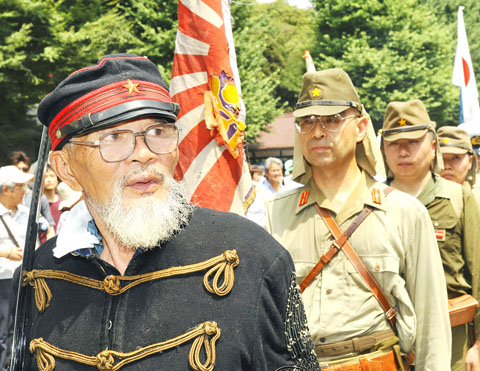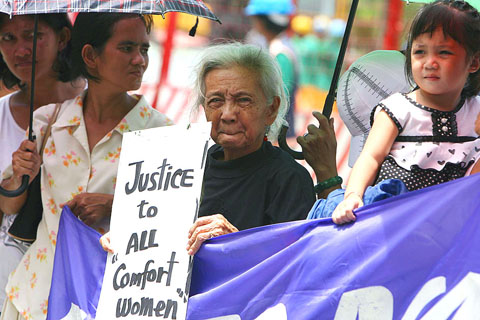Three Japanese Cabinet ministers paid their respects yesterday at a controversial war shrine in Tokyo that is vilified by Asian neighbors for glorifying past military aggressions.
The visits to the Yasukuni shrine by Farm Minister Seiichi Ota, Justice Minister Okiharu Yasuoka and Seiko Noda, state minister in charge of consumer affairs, came on the 63rd anniversary of Japan’s surrender in World War II.
Former prime ministers Junichiro Koizumi and Shinzo Abe also stopped by separately at the Shinto shrine, which honors some 2.5 million Japanese war dead, including executed war criminals.

PHOTO: AFP
But Prime Minister Yasuo Fukuda has vowed to stay away from Yasukuni, focusing instead on improving ties with neighboring countries.
Koizumi’s repeated visits to Yasukuni while in office from 2001 to 2006 hamstrung relations with China and South Korea, who denounced the act as a sign Japan had failed to fully atone for invasions and atrocities during the period.
Nationalists and many conservative Japanese, however, see the shrine as a legitimate way to honor fallen soldiers. They accuse critics of trying to force Japan into paralyzing war guilt even after more than six decades under a strictly pacifist Constitution.

PHOTO: EPA
“I visited the shrine because I hope those who contributed their lives in the past wars would rest in peace,” the Kyodo news agency quoted Ota as saying.
Fukuda’s pointed refusal to visit Yasukuni is part of an outreach to mend fences with Japan’s neighbors.
In the most conspicuous sign of progress so far, Chinese President Hu Jintao (胡錦濤) traveled to Japan in May — the first visit by a Chinese leader in a decade — and held a formal summit with Fukuda, and they agreed to work together on everything from climate change to territorial disputes.
Like many right-wingers at the shrine yesterday, Yoshimitsu Sanada, 75, admonished the prime minister for not making a Yasukuni pilgrimage for Aug. 15 — a day that every year draws crowds of veterans, their relatives, tourists and militarists to the shrine.
“He’s stupid,” Sanada said of Fukuda. “He’s a Chinese servant.”
Sanada, who wore an old army uniform and carried a sword, said his uncle died in Saipan during World War II.
Other members of Fukuda’s recently reshuffled Cabinet are unlikely to visit the shrine. Foreign Minister Masahiko Komura said at a press conference he would not go to Yasukuni.
Fukuda paid homage yesterday to Japan’s war dead by laying flowers at the secular Chidorigafuchi National Cemetery. He also attended a memorial service in Tokyo along with the emperor and empress.
“Once more, we renew our vow to renounce war,” Fukuda said at the service. “We pledge to lead the world as a peaceful and harmonious country and to work proactively toward establishing permanent world peace.”
Despite Fukuda’s open opposition to visiting Yasukuni, other politicians have remained steadfast in their support. A group of 62 lawmakers went to the shrine in April amid heated wrangling over the release of a documentary film about Yasukuni directed by a Chinese national.
The threat of right-wing violence intimidated several theaters in Tokyo into canceling plans to show the film, and the distributor delayed the original April 12 premier by several weeks. When Yasukuni finally opened on May 3, it played to sold-out crowds without incident.

Eleven people, including a former minister, were arrested in Serbia on Friday over a train station disaster in which 16 people died. The concrete canopy of the newly renovated station in the northern city of Novi Sad collapsed on Nov. 1, 2024 in a disaster widely blamed on corruption and poor oversight. It sparked a wave of student-led protests and led to the resignation of then-Serbian prime minister Milos Vucevic and the fall of his government. The public prosecutor’s office in Novi Sad opened an investigation into the accident and deaths. In February, the public prosecutor’s office for organized crime opened another probe into

RISING RACISM: A Japanese group called on China to assure safety in the country, while the Chinese embassy in Tokyo urged action against a ‘surge in xenophobia’ A Japanese woman living in China was attacked and injured by a man in a subway station in Suzhou, China, Japanese media said, hours after two Chinese men were seriously injured in violence in Tokyo. The attacks on Thursday raised concern about xenophobic sentiment in China and Japan that have been blamed for assaults in both countries. It was the third attack involving Japanese living in China since last year. In the two previous cases in China, Chinese authorities have insisted they were isolated incidents. Japanese broadcaster NHK did not identify the woman injured in Suzhou by name, but, citing the Japanese

RESTRUCTURE: Myanmar’s military has ended emergency rule and announced plans for elections in December, but critics said the move aims to entrench junta control Myanmar’s military government announced on Thursday that it was ending the state of emergency declared after it seized power in 2021 and would restructure administrative bodies to prepare for the new election at the end of the year. However, the polls planned for an unspecified date in December face serious obstacles, including a civil war raging over most of the country and pledges by opponents of the military rule to derail the election because they believe it can be neither free nor fair. Under the restructuring, Myanmar’s junta chief Min Aung Hlaing is giving up two posts, but would stay at the

YELLOW SHIRTS: Many protesters were associated with pro-royalist groups that had previously supported the ouster of Paetongtarn’s father, Thaksin, in 2006 Protesters rallied on Saturday in the Thai capital to demand the resignation of court-suspended Thai Prime Minister Paetongtarn Shinawatra and in support of the armed forces following a violent border dispute with Cambodia that killed more than three dozen people and displaced more than 260,000. Gathered at Bangkok’s Victory Monument despite soaring temperatures, many sang patriotic songs and listened to speeches denouncing Paetongtarn and her father, former Thai prime minister Thaksin Shinawatra, and voiced their backing of the country’s army, which has always retained substantial power in the Southeast Asian country. Police said there were about 2,000 protesters by mid-afternoon, although